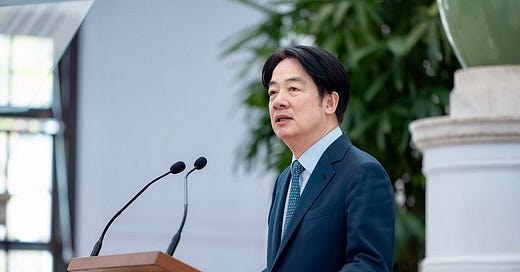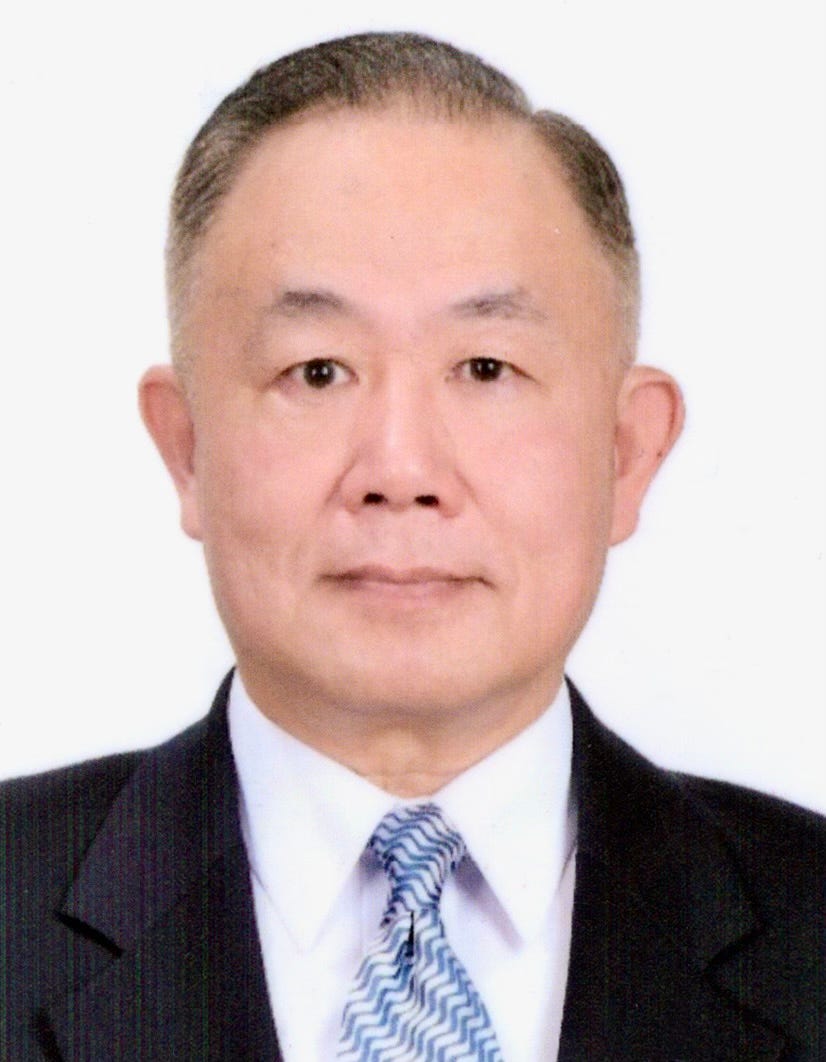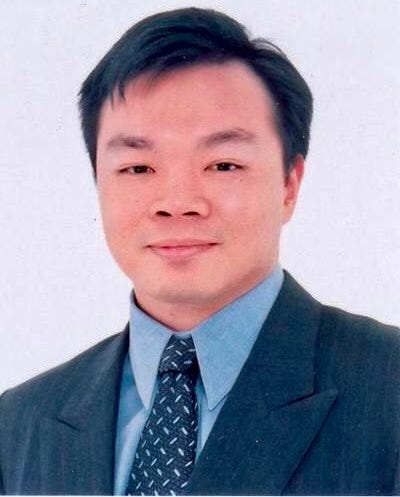China In Arms BOOKSTORE and GIFT SHOP!
Twitter AND YouTube Page
Subscribe: $5 Month/$50 Annual (unable to secure a subscription contact the bank for permission for Stripe deposits).
Paid Subscriptions can choose 2 free books AND if you live in Taipei, a free coffee and a couple hours of conversation.
19 March 2025 (Wednesday)
KMT Accuses DPP of Opting for Dictatorship
Please Read and Give Your Thoughts
By Wendell Minnick (Whiskey Mike) 顏文德
TAIPEI - It would appear that the Chinese Nationalist Party (KMT} is suggesting that the pro-independence party, the Democratic Progressive Party, might make a power grab that gives the DPP complete authority over Taiwan.
This is a commentary on President Lai Ching-te’s "Seventeen National Security Measures", jointly written by KMT Legislator Chen Yeong-kang and Kao Si-po, Director & Convener of the Domestic and Legal Affairs Group of the National Policy Foundation.
Please give me your thoughts in the Comment Section on how this KMT statement should be interpreted.
You can download the document or read below:
The Legitimacy and Legality of Lai’s Seventeen Measures
March 17, 2025, 05:10 | United Daily News
CHEN Yeong-kang / KMT Legislator, Director & Convener of National Security Group, National Policy Foundation
Kao Su-po / Director & Convener of Domestic and Legal Affairs Group, National Policy Foundation
In a recent large-scale civilian Regional Security Tabletop Exercise (TTX), the legal framework governing ministerial responsibilities and inter-agency coordination during a national emergency was simulated. Unexpectedly, just a week later, President Lai Ching-te’s "Seventeen Measures" were introduced following the National Security Council (NSC) meeting, with legal preparedness as the starting point. In a democratic society, where freedom of speech and a decentralized political-economic system are fundamental principles, achieving a transition from peacetime to wartime governance to concentrate willpower and strength, requires essentially a fortified society and a strict identification of friends or foes within. However, this necessity for concentration stands in fundamental contradiction with democratic values.
Under a national emergency, peace-oriented and anti-war speech would be suppressed; executive power would be maximized, severely restricting private sector and individual social and economic activities, especially those involving foreign engagement. Such measures risk severely infringing on human rights. As a result, constitutional democracies set high substantive and procedural thresholds for emergency transitions to ensure both legitimacy and legality. A democratic society must never accept a system where the critical threshold between peacetime and wartime are blurred, and human rights can be sacrificed at will—such a model exists only in a state such as North Korea, a country always on high alert against perceived threats. Is Lai’s administration steering Taiwan toward a quasi-wartime regime?
From a constitutional perspective, while the President of the Republic of China (Taiwan) is granted broad discretion in determining national security threats, the six-hour martial law fiasco under South Korean President Yoon Suk-yeol—which even led to legal action against him—demonstrates that many have attempted to exploit national security as a disguise for political maneuvering. Before Yoon’s martial law declaration,
none of South Korea’s allies had reported abnormal activities from North Korea or terrorist attack, nor did South Koreans perceive their country to be in immediate danger. Yoon’s vague claims that the National Assembly was paralyzing the government and colluding with North Korea to threaten national security, followed by his immediate deployment of the military to block the legislature from reviewing the legality of martial law, were widely condemned as lacking substantive legitimacy and procedural legality.
In Taiwan, on March 13, the National Security Council held a meeting that led to the unveiling of Lai’s Seventeen measures. Among them, the most consequential measure was designating the mainland Chinese government as a "hostile foreign force" in legal terms, fundamentally undermining all existing institutional ties across the Taiwan Strait—including over twenty Cross-Strait agreements and the Economic Cooperation Framework Agreement (ECFA). The other primary measures outlined by the Administration include the restoration of military trial and a comprehensive tightening of Cross-Strait social exchanges. It is evident that these measures aim to fortify Taiwan’s internal ideological alignment and define a clear enemy. However, once Taiwan initiates such measures, predictable countermeasures from China will rapidly escalate cross-strait tensions, paving the way for even more draconian next moves from Taiwan.
Some might believe that restoring military trial is solely intended for current and former military personnel involved in espionage cases. However, under Taiwan’s mobilization laws, any civilian undergoing reserve duty training and donning a military uniform instantly becomes a soldier, not to mention the disputed “senior high school students registration control.” Legislators, council members, village representatives, religious groups, civil organizations with cross-strait activities , mainland Chinese spouses of Taiwanese, Taiwanese businesspeople in China, and young Taiwanese working in mainland are all now subject to registration and surveillance. While this might seem harmless for now, at a critical moment in the future, such registration data could swiftly transform into a "list of local collaborators." Mainland Spouses might be denied entry to Taiwan or subjected to centralized control. Historical precedents, such as how the United States treated Japanese-Americans during World War II
and how Cold War-era McCarthyism targeted scientists like Oppenheimer, serve as stark warnings.
The legitimacy of Lai’s Seventeen Articles may be tested sooner than expected. While President Lai may believe fostering a stronger enemy consciousness is necessary, reports indicate that China and the U.S. are negotiating a potential Trump-Xi summit. If Trump and Xi reach a political deal, Taiwan’s most important ally and the international democracy camp may pragmatically pivot toward Beijing out of necessity. At that point, Taiwan could find itself diplomatically isolated. Lai becoming an internationally recognized troublemaker would be a minor issue; however, Taiwan falling into a strategic nowhere due to his decisions would be a far greater catastrophe. The fact that no diplomatic ally has issued a positive response to the Seventeen Measures speaks for itself.
Furthermore, Lai’s Seventeen Measures require multiple legislations, which fall under the authority of the Legislative Yuan. Taiwan’s constitutional framework grants the President and Executive Yuan the authority to propose national security measures, but ensuring proportionality, preventing excessive human rights violations, and overseeing legality is a core responsibility of the legislature. Thus, if the Legislative Yuan thoroughly reviews the government’s proposals, it would be fully in line with the ROC’(Taiwan( constitutional norms. However, should President Lai attempt to frame legitimate legislative oversight as a national security threat, it would merely serve as fuel for his mass recall campaign against opposition legislators. Has Yoon Suk-yeol’s example not provided enough of a cautionary tale?
Even a minority President can earn the respect of the majority—former President Chen Shui-bian managed to do so in his first year. The key lies in understanding that "the world is vast, and no single person can rule it alone." Whether Lai chooses to pursue ideological absolutism or exercise pragmatic governance ultimately depends on himself.







I wonder how many of you foreigners are browsing social media posts in Taiwan, in Chinese. Call me biased, but what I've felt since Ma was still the president, is that DPP has been using the MSM in Taiwan, social media, trolls, activists, and all sorts of means to sway and even throw dirt at dissidents. Lai himself urged their own trolls to stop attacking him while he wanted to run for president in 2019 ( https://www.cna.com.tw/news/firstnews/201904130177.aspx ). Tons of activists are used as tools just to drag down KMT, with the environment nuts being the most obvious ones.
I'm born in '91. KMT is depicted to be the villain in the past from the textbook and DPP-affiliated media. But from what I see and feel, DPP is the one that tries to become, if not surpass, the KMT in the past.
Both parties are filled with politicians that disgust me, but at least KMT can be balanced while DPP will use all the dirty tricks just to stay in control.
Wendell: since you have been so critical of the DPP in the past, and of Taiwan's unwillingness to face up to the existential threat that it faces, I presume that you approve this move by the DPP, as an indication that they now take the threat seriously.